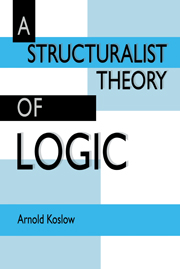Book contents
- Frontmatter
- Contents
- Preface
- Part I Background
- Part II Implication relations
- 5 The theory of implication relations
- 6 Implications: Variations and emendations
- 7 Familiar implication relations: Deducibility and logical consequence
- 8 Implication relations: Direct and derived
- 9 Implications from implications
- 10 Implication relations and the a priori: A further condition?
- Part III The logical operators
- Part IV The modal operators
- Appendix A An implication relation for the integers in the programming language BASIC
- Appendix B Symmetric sequents as products of implication relations and their duals
- Appendix C Component-style logical operators and relevance
- Notes
- Bibliography
- Index
6 - Implications: Variations and emendations
Published online by Cambridge University Press: 05 May 2010
- Frontmatter
- Contents
- Preface
- Part I Background
- Part II Implication relations
- 5 The theory of implication relations
- 6 Implications: Variations and emendations
- 7 Familiar implication relations: Deducibility and logical consequence
- 8 Implication relations: Direct and derived
- 9 Implications from implications
- 10 Implication relations and the a priori: A further condition?
- Part III The logical operators
- Part IV The modal operators
- Appendix A An implication relation for the integers in the programming language BASIC
- Appendix B Symmetric sequents as products of implication relations and their duals
- Appendix C Component-style logical operators and relevance
- Notes
- Bibliography
- Index
Summary
Recent studies have suggested ways in which the theory of implication relations might be weakened. There have not, to my knowledge, been any suggestions that would strengthen the theory. We have already referred to the suggestion that the Dilution condition be rejected – or at least not required. The theory of the logical operators that we shall develop in this study uses the full six conditions on implication relations. It is also possible to relativize the operators to nonmonotonic “implication” relations. The behaviors of the operators will, as a consequence, be different. The section later in this study that is devoted to component implication (relevance implication) is a case in point. But the general picture of the logical operators in the nonmonotonic case is largely unexplored, and thus far we have no systematic results to present.
The Cut condition has been included as a part of the characterization of an implication relation. When this condition and the others are taken as rules of inference of a system of logic, it can sometimes be shown that the Cut rule is eliminable – that is, it becomes, for such systems, a derived rule of inference.
One might suspect that the Cut condition is a consequence of the remaining conditions, but it is not.
Information
- Type
- Chapter
- Information
- A Structuralist Theory of Logic , pp. 39 - 41Publisher: Cambridge University PressPrint publication year: 1992
